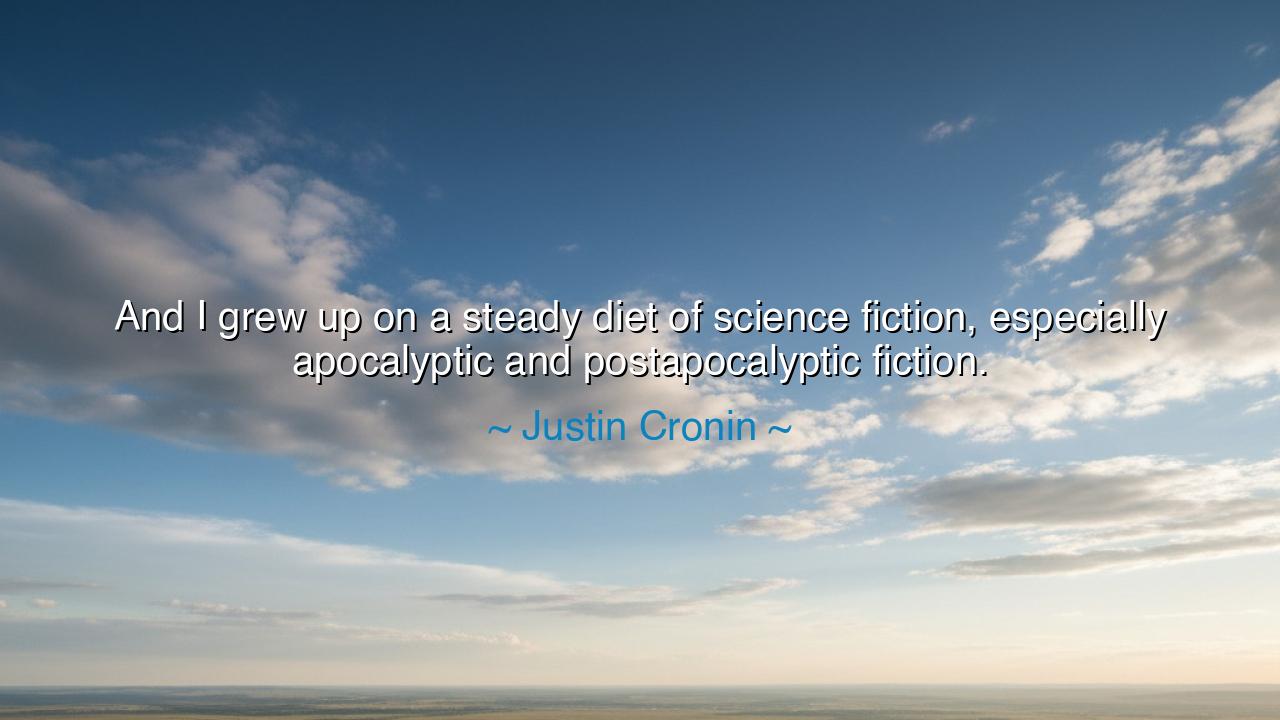
And I grew up on a steady diet of science fiction, especially
And I grew up on a steady diet of science fiction, especially apocalyptic and postapocalyptic fiction.






When Justin Cronin said, “And I grew up on a steady diet of science fiction, especially apocalyptic and postapocalyptic fiction,” he was not merely recalling the books of his youth—he was revealing the soil in which his imagination took root. His words speak of a generation nourished by visions of the end, raised on stories where civilization collapses, and humanity is tested in the ruins. It is a confession of influence, but also an insight into the deeper hunger that such tales satisfy: the longing to confront extinction, and to rediscover meaning in what survives.
To say one grew up on a “steady diet” of something is to speak of more than preference—it is a form of spiritual sustenance. For Cronin, this “diet” of speculative worlds was not mere entertainment; it was nourishment for the mind, a preparation for understanding the fragility of existence. The ancients, too, had their apocalypses. The myth of Ragnarök in Norse legend, the flood of Deucalion in Greek lore, the burning cycles of time in Hindu cosmology—all are humanity’s first science fiction, imagining both the destruction and renewal of worlds. Cronin, inheritor of this tradition, reminds us that the fascination with the end is not new. It is as old as the human urge to ask, “What comes after the fire?”
In his choice of apocalyptic and postapocalyptic fiction, Cronin reveals a paradox at the heart of creation: that destruction is often the prelude to rebirth. Such stories, bleak though they seem, are rarely about despair—they are about survival, courage, and the rediscovery of virtue in a fallen age. The ancients would have recognized this as a moral allegory. When the philosopher Plato described Atlantis sinking beneath the waves, he was not writing of doom, but of hubris and renewal—the eternal cycle that humbles the proud and uplifts the worthy. So too does modern apocalyptic fiction remind us that every civilization, even our own, carries the seeds of both greatness and ruin.
Cronin’s reflection also reveals a truth about artistic inheritance. No creator arises in a vacuum; every imagination feeds on what came before. The young reader who devours such stories is not escaping reality, but preparing to interpret it. Just as Homer’s heroes inspired the poets of Rome, so did the visions of Asimov, Bradbury, and Orwell shape the storytellers of the present. When Cronin speaks of his “steady diet,” he is naming the lineage of dreamers who taught him that even in ruin, there is revelation—that the collapse of one world is merely the prologue to another’s awakening.
There is also a psychological wisdom in his words. The fascination with the apocalypse often arises in times of uncertainty, when people sense the crumbling of their own institutions or ideals. Such fiction offers a mirror to the anxieties of the age, yet also a cure for them. By imagining the end, humanity rehearses resilience. By envisioning collapse, we rediscover the strength to rebuild. The ancients performed this ritual through myth; the moderns, through fiction. Cronin’s upbringing on these stories made him a chronicler not of despair, but of endurance—a poet of the human capacity to begin again.
Consider the lesson of Virgil’s Aeneas, who watched Troy burn and carried his father upon his back toward an unknown future. The city’s fall was not the end, but the beginning of Rome. Likewise, every apocalypse, whether mythic or imagined, conceals the seed of creation. The fire that destroys also purifies; the void that terrifies also invites. Cronin’s affection for such tales reflects an ancient truth—that in envisioning destruction, we affirm our belief in rebirth.
And so, let this be the teaching drawn from his reflection: the stories we consume shape the worlds we create. Feed your imagination wisely, for what you take in will one day find voice in what you build. Embrace the tales of endings not as omens of doom, but as lessons in resilience. For the one who learns from apocalyptic visions does not fear the ruin of the world—he understands that every ending is but the turning of the age, and that humanity’s greatest power is not to avoid the fire, but to rise renewed from its ashes.






AAdministratorAdministrator
Welcome, honored guests. Please leave a comment, we will respond soon